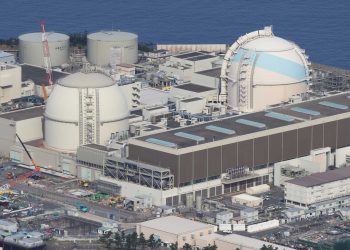Agence France-Presse,
North Korea will soon receive the funds which for months had blocked a nuclear disarmament deal and should move quickly to honour the pact, a senior South Korean official said Friday.
Hopes are rising of an end to the four-month standoff after Macau officials said more than 20 million dollars in North Korean funds which had been frozen in Banco Delta Asia (BDA) have finally been transferred.
North Korea had adamantly refused to implement the six-nation deal reached in February until it receives the Macau funds, which the US says were frozen in 2005 on suspicion of money-laundering and counterfeiting.
Thursday's transfer removes the “first obstacle” to denuclearisation, said Seoul's chief nuclear negotiator Chun Yung-Woo.
“From now on, we have to focus on the implementation of the February 13 agreement,” he told journalists after returning from talks in Washington.
“It should not take too much time to send the money so the only process left is for North Korea to confirm the transfer.”
Denuclearisation itself “is much more difficult to achieve than the BDA issue,” Chun cautioned.
The communist state insisted on an international transfer to prove it has regained access to the global banking system, after the US blacklisting of BDA scared many other banks off North Korean business.
In a complex deal, the cash was reportedly to be transferred to the New York Federal Reserve, then to the Russian central bank and onwards to a private Russian bank where the North Koreans have an account.
It was unclear whether this process would solve the wider banking problem to the North's satisfaction, or when it would be completed.
Macau finance minister Francis Tam Pak Yuen said Thursday that more than 20 million dollars from “dozens of accounts” had been remitted.
The Pyongyang-linked accounts totalled 25 million and it was not clear what would happen to the remainder. But the accounts belong to private companies doing business with the North as well as its state agencies.
Negotiators from the six countries — North and South Korea, China, Japan, Russia and the United States — had struggled to resolve the dispute.
Few banks were willing to handle the disputed money for fear of sullying their own reputations and falling foul of the US Patriot Act under which the blacklist was decreed.
The North, which sparked international outrage when it tested an atom bomb last October, agreed in February to disable its nuclear programmes in return for badly needed fuel aid and diplomatic benefits.
As a first step it was to have shut down its Yongbyon reactor — which produces the raw material for bomb-making plutonium — by mid-April, but the deadline passed with no progress.
Chief US nuclear negotiator Christopher Hill, currently visiting Mongolia was to travel on to China, South Korea and Japan to discuss “potential next steps” to reconvene the six-nation talks, said US State Department spokesman Sean McCormack.
South Korea's Chun said the talks would resume soon after the North implements its disarmament pledge.
“I just want this to be over and get back to what is important — which is to get moving on to denuclearisation and we have got some time to make up,” Hill said in Washington on Wednesday.









